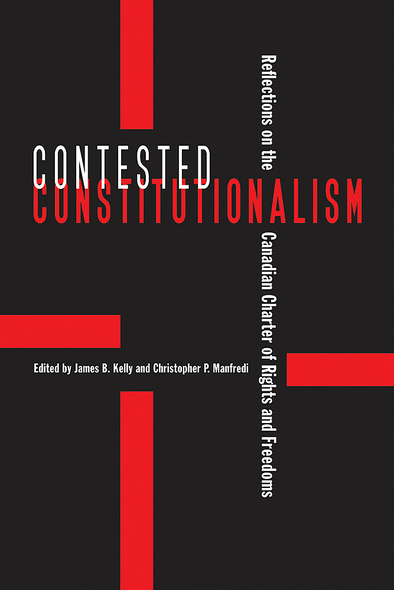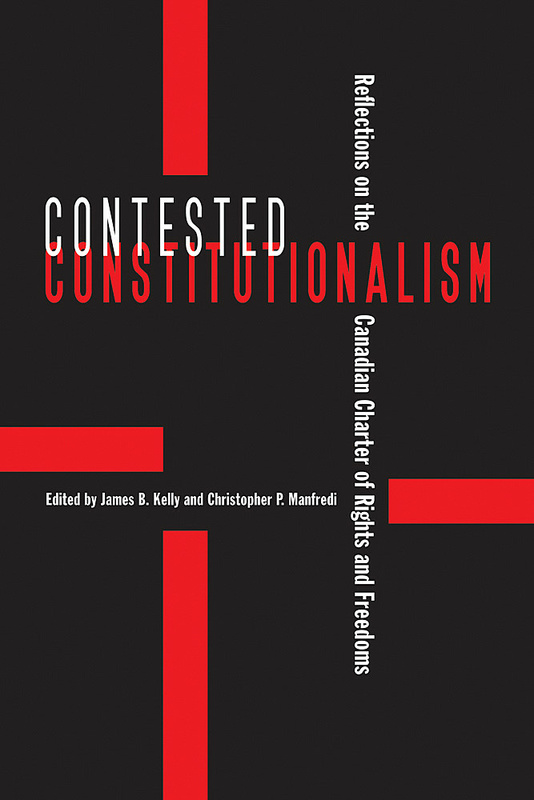
Contested Constitutionalism
Reflections on the Canadian Charter of Rights and Freedoms
The introduction of the Canadian Charter of Rights and Freedoms in 1982 was accompanied by much fanfare and public debate. Twenty-five years later the Charter remains the subject of controversy as social commentators and public intellectuals assess its influence on political institutions, public policy, and conceptions of citizenship in the Canadian federation.
Contested Constitutionalism does not celebrate the Charter; rather it offers a focused critique by distinguished scholars of law and political science of its effect on democracy, judicial power, and the place of Quebec and Aboriginal peoples in Canada. Employing a diversity of methodological approaches, the contributors address three themes – governance and institutions, policy making and the courts, and citizenship and identity politics – and conclude that the Charter has had a profound impact on Canadian political institutions, constitutionalism, and law. They disagree, however, as to whether the Charter has been beneficial for Canada, and they debate the broader implications of the entrenchment of the Constitution Act, 1982.
Sophisticated and nuanced, Contested Constitutionalism moves debate about the Charter beyond assessments of its appropriateness to explore its impact – for better or worse – on Canadian politics and society.
This volume is a major contribution to the study of constitutional politics in Canada. Kelly and Manfredi have assembled an ‘all star team’ of scholars in the field. The result is a volume with thoughtful perspectives on governance and institutions, policy making and the courts, and citizenship and identity. This should be required reading for both specialists in the field and those with an interest in constitutional and Canadian politics.
James B. Kelly is associate professor in the Department of Political Science at Concordia University. Christopher P. Manfredi is Dean of Arts and a professor in the Department of Political Science at McGill University.
Contributors: Dennis Baker, Sujit Choudhry, Janet L. Hiebert, Grant Huscroft, Rainer Knopff, Graham Fraser, Matthew Hennigar, Kiera L. Ladner, Guy Laforest, Sylvia LeRoy, Antonia Maioni, Michael McCrossan, Andrew Petter, Troy Riddell, Kent Roach, Peter H. Russell
Introduction
1 Should We Cheer? Contested Constitutionalism and the Canadian Charter of Rights and Freedoms / James B. Kelly and Christopher P. Manfredi
Part 1: Governance and Institutions
2 Legalise This: The Chartering of Canadian Politics / Andrew Petter
3 Rationalizing Judicial Power: The Mischief of Dialogue Theory / Grant Huscroft
4 Courting Controversy: Strategic Judicial Decision Making / Rainer Knopff, Dennis Baker, and Sylvia LeRoy
5 Legislative Activism and Parliamentary Bills of Rights: Institutional Lessons for Canada / James B. Kelly
6 Compromise and the Notwithstanding Clause: Why the Dominant Narrative Distorts Our Understanding / Janet L. Hiebert
Part 2: Policy Making and the Courts
7 Judicializing Health Policy: Unexpected Lessons and an Inconvenient Truth / Christopher P. Manfredi and Antonia Maioni
8 National Security and the Charter / Kent Roach
9 Canadian Language Rights: Liberties, Claims, and the National Conversation / Graham Fraser
10 Explaining the Impact of Legal Mobilization and Judicial Decisions: Official Minority Language Education Rights outside Quebec / Troy Riddell
11 Reference re Same-Sex Marriage: Making Sense of the Government’s Litigation Strategy / Matthew Hennigar
Part 3: Citizenship and Identity
12 Bills of Rights as Instruments of Nation Building in Multinational States: The Canadian Charter and Quebec Nationalism / Sujit Choudhry
13 The Internal Exile of Quebecers in the Canada of the Charter / Guy Laforest
14 The Road Not Taken: Aboriginal Rights after the Re-Imagining of the Canadian Constitutional Order / Kiera L. Ladner and Michael McCrossan
Conclusion
15 The Charter and Canadian Democracy / Peter H. Russell
Notes
Index













